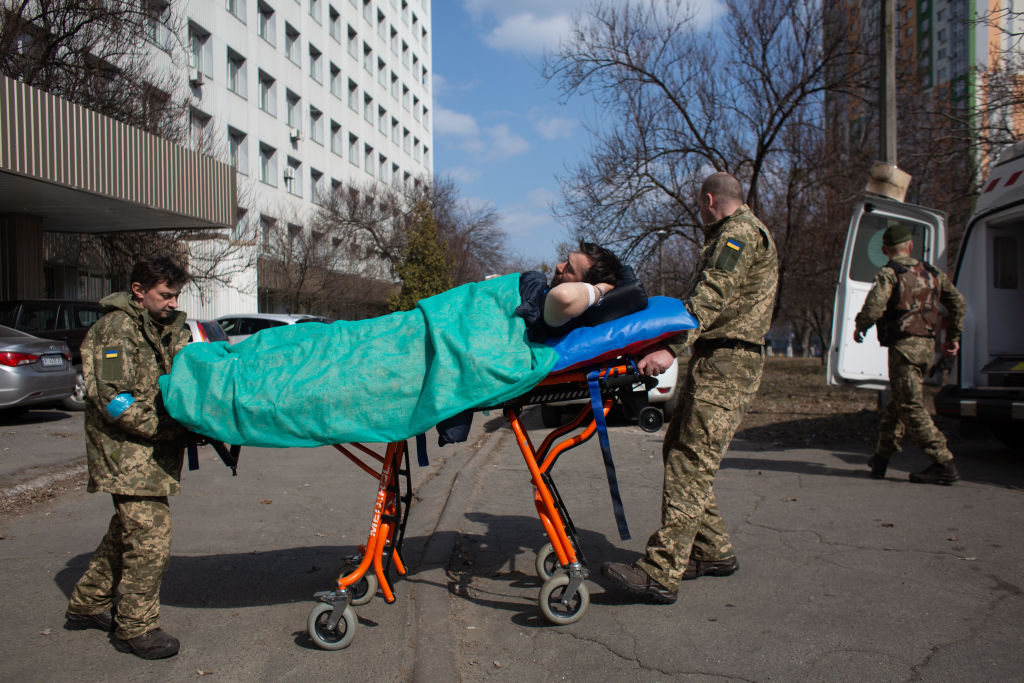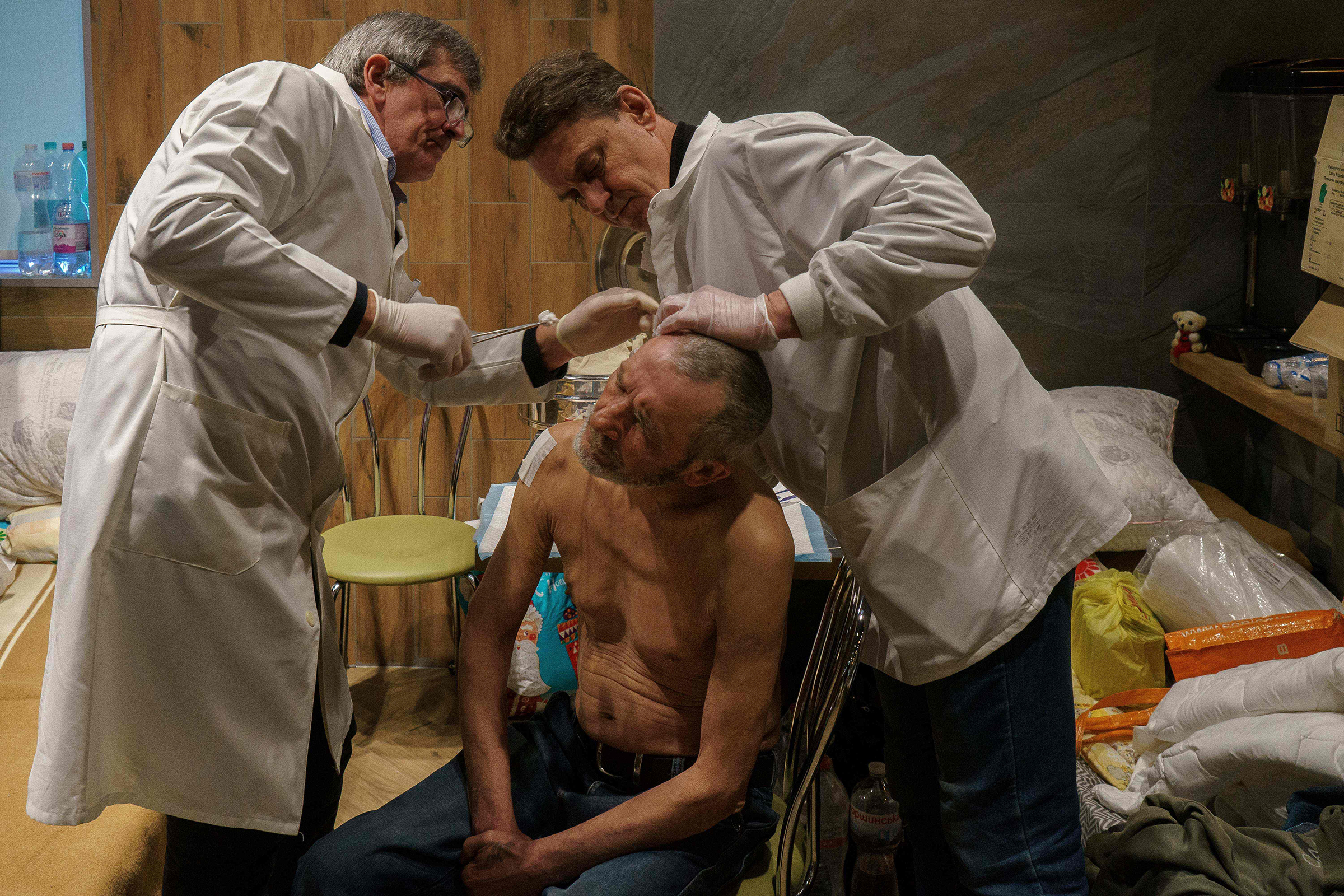
A few days after the Russian invasion of Ukraine, I received an unusual note on Twitter. A Syrian man introduced himself as Mustafa Kayyali.
“We are a group of medical doctors with specialization in paramedics, trauma, and war medicine,” Mustafa wrote. “We have suffered from the aggression of Russian forces for the last 8 years, and we trained people to deal with urgent cases, and how to save their lives. We would like to help Ukraine and its people.” He made it clear Syrian doctors had unique experience with treating victims of chemical weapons attacks. Chemical weapons have been used repeatedly against civilians in Syria by the dictator Bashar al-Assad’s army and the Russian forces that support him.
I passed Mustafa’s message to my contacts. Two weeks later I was informed that the first training of Syrian doctors for Ukrainian medics had been conducted. More followed, and as of now, several thousand Ukrainian doctors have been trained by Syrian medical professionals on how to deal with patients who suffered from the use of chemical and biological weapons. The training sessions are conducted by Dr Abdullah Abdulaziz Alhaji, MD, a specialist in general surgery. He is the president of the Academy of Health Sciences, established in 2011 after the start of war in Syria to provide medical training to local doctors and civilians. It currently runs programs in paramedics, nursing and physical therapy.
“When the Syrian regime attacked our population, we suffered from the reduction of medical staff. Many doctors were arrested, killed or fled Syria. We established our Academy with short courses lasting 15 days, to provide training on trauma first response. There were no paramedics or emergency specialists before in Syria,” Dr Alhaji explains. “With time, Assad’s war machine became more aggressive—more bombings, more shells, more rockets. The more war went on, the more things we did. Syrian people were suffering from the use of chemical weapons. So we trained our students and taught them how to treat different types of injuries.”
The Academy had to move several times because its premises were destroyed by Russian airstrikes. It settled in Idlib, the region near the Turkish border which is currently under control of the opposition forces. “For several months, we have been watching the situation in Ukraine, and we thought that we should help doctors there,” says Mustafa Kayyali, vice-president at Academy of Health Sciences. “Many of my colleagues studied in Ukraine, worked there, and we knew that it is a loving country.”’
He continued, “We are happy to help, because people of Syria and Ukraine are fighting against the same enemy.”
It was the Syrian medics’ experience with patients affected by chemical weapons that caught the attention of Ukrainian doctors. As NATO and the U.S. warn that Russia might use such forbidden weapons in Ukraine, there is a growing sense of urgency to prepare.

“When Russia started to bomb civilians and residential areas in Ukraine, we lost all illusions that it would stop and would act in the framework of an international humanitarian law,” says Mladena Kachurets, a former deputy health minister of Ukraine and director of the department of personnel development and education at Dobrobut, one of the biggest private clinics in Kyiv. She immediately responded to the Syrian doctors’ idea. “We understood that we have to prepare for the worst, that we have to be ready and cannot ignore a threat of chemical weapons attacks,” Kachurets says. After a successful introductory session brought together a small number of Ukrainian and Syrian doctors by video link, four online lectures were scheduled, open to all medical personnel in Ukraine. The first two took place ten days ago.
“There was a huge interest in these lectures, both from doctors and nurses. We advertised the training sessions on social media, and more than 13,000 people expressed their interest. Medical workers from all parts of Ukraine, including medical staff from hospitals in war-torn areas, joined them online,” Kachurets said.
Read More: What It Will Take for Ukraine to Win the War
“We posted the recordings on Facebook and YouTube so those who were unable to attend live could watch them later. We are now working on Ukrainian translation to make sure every doctor and nurse in Ukraine has access to the lectures.” As of now, the recordings have been watched more than 30,000 times. More are planned, including lectures aimed at the general Ukrainian public.
Yuliya Shuklina, MD, a head of otolaryngology department at a big hospital in Kyiv, has been living, along with hundreds of colleagues, on the premises of her hospital since Russia invaded Ukraine, working day and night to treat the wounded and those with chronic diseases.
“The war changed all of us,” Dr. Shuklina says, speaking via a videocall during a short break in between treating patients and before a siren, announcing an air raid alert in Kyiv, interrupts our conversation. “In the first days of war, I was very confused. I have 26 years of experience working as an otolaryngologist surgeon, but I have never dealt with sorting of patients and treatment of combat injuries. We are studying and watching a lot of lectures these days.”
“‘I studied how to react to a chemical weapons attack at the university, but I forgot it because I never thought I would have to apply it,” she says. “At the session with Syrian doctors, I learned how to determine what kind of a toxin has been used and how to provide help accordingly. This is something very different to a normal injury, when you can determine the impact visually. It is not the case with the victims of a chemical weapons attack, you can’t assess the damage with a naked eye.”
“We really appreciate Syrian doctors sharing their first-hand experience. I don’t feel panic anymore hearing about the possibility of a chemical weapons attack. I have an algorithm on how to act. Now I know I will not be confused, I will not be a burden, and will be able to help,” Dr. Shuklina says. “I hope, though, this knowledge will only remain theoretical.”
After the sessions Dr. Shuklina went to the hospital management asking them to order antidotes, which vary with the weapon used. “There is a lot of humanitarian assistance, including medicine, delivered to Ukraine these days,” says Kachurets, the former deputy health minister. ”But our doctors are focused on what they need to treat injured people who have multiple trauma, shrapnel wounds, broken limbs. In their lists of necessary supplies, I haven’t seen personal protective equipment to prepare for chemical attacks. I think it should be added to supply lists, and the stockpile of antidotes for different types of toxins must be created in advance.”
Kayyali, for his part, is hoping to organize some in-person lectures for Ukrainian doctors in the future. “If there is a safe location somewhere in Ukraine, we would be happy to travel there and do a face-to-face session,’” he says. In the meantime, he has a message for his Ukrainian colleagues: be strong and train more people to provide medical aid.
“The war can last long, for years, we Syrians know it. For that reason, you need to train more people, including the general public. People must be trained to treat those affected by chemical weapons and even nuclear weapons,” Kayyali says. “You are dealing with criminals and you can expect anything to happen.”
More Must-Reads from TIME
- Cybersecurity Experts Are Sounding the Alarm on DOGE
- Meet the 2025 Women of the Year
- The Harsh Truth About Disability Inclusion
- Why Do More Young Adults Have Cancer?
- Colman Domingo Leads With Radical Love
- How to Get Better at Doing Things Alone
- Michelle Zauner Stares Down the Darkness
Contact us at letters@time.com